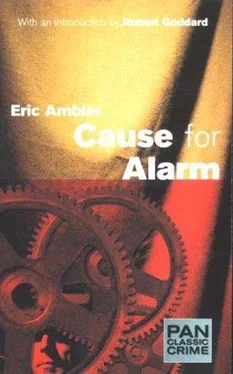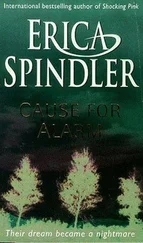Eric Ambler - Cause for Alarm
Здесь есть возможность читать онлайн «Eric Ambler - Cause for Alarm» весь текст электронной книги совершенно бесплатно (целиком полную версию без сокращений). В некоторых случаях можно слушать аудио, скачать через торрент в формате fb2 и присутствует краткое содержание. Жанр: Криминальный детектив, на английском языке. Описание произведения, (предисловие) а так же отзывы посетителей доступны на портале библиотеки ЛибКат.
- Название:Cause for Alarm
- Автор:
- Жанр:
- Год:неизвестен
- ISBN:нет данных
- Рейтинг книги:3 / 5. Голосов: 1
-
Избранное:Добавить в избранное
- Отзывы:
-
Ваша оценка:
- 60
- 1
- 2
- 3
- 4
- 5
Cause for Alarm: краткое содержание, описание и аннотация
Предлагаем к чтению аннотацию, описание, краткое содержание или предисловие (зависит от того, что написал сам автор книги «Cause for Alarm»). Если вы не нашли необходимую информацию о книге — напишите в комментариях, мы постараемся отыскать её.
Cause for Alarm — читать онлайн бесплатно полную книгу (весь текст) целиком
Ниже представлен текст книги, разбитый по страницам. Система сохранения места последней прочитанной страницы, позволяет с удобством читать онлайн бесплатно книгу «Cause for Alarm», без необходимости каждый раз заново искать на чём Вы остановились. Поставьте закладку, и сможете в любой момент перейти на страницу, на которой закончили чтение.
Интервал:
Закладка:
He saw me at the same moment that I saw him. Our eyes met. I prepared for a greeting. But, without a flicker of recognition in his eyes, he looked straight through me. Another second and he was past. I recovered myself quickly.
“I beg your pardon, General.”
He smiled and struck another match.
“Don’t apologise, Mr. Marlow. She is, I agree, quite lovely here.”
“Here?”
“A common Slav type, Mr. Marlow. In Belgrade you could take your choice. The man with her is her brother. Haven’t you seen them before?”
“No.”
He attended to his cigar. “The man is called Zaleshoff, Andreas Prokovitch Zaleshoff. Her name is Tamara Prokovna. Russian, of course; but they were both, I believe, brought up in the United States. I’m afraid,” he added gravely, “that I cannot recommend you to pursue your interest in the lady. The man is an agent of the Soviet Government, and it is highly probable that his sister is also.”
I managed a light laugh.
“That sounds very sensational, General. But I assure you that I hadn’t the least intention of pursuing my interest. I have a fiancee in England.” The words sounded to me appallingly pompous and unreal, but he nodded as if satisfied.
“A foreigner in Italy,” he said, “does well to be discreet. Excuse me.”
To my relief, he turned aside to speak to some people who were passing. I had time to collect myself. Either Vagas was making a clumsy effort to impress me or I was moving in rather deeper waters than I had thought. What was it Zaleshoff had said? “Fortunately, I’ve got other contacts.” But it was ridiculous. In any case, I was wishing very earnestly that I had not come. I passed in quick review the possible excuses I might make for leaving at the next interval. I might plead illness, or a forgotten business engagement. I might…
Vagas touched me on the arm.
“I want you to meet the signora Bernabo, Mr. Marlow.” He turned to the fat, shrill-voiced woman by his side. “ Le voglio presentare il signor Marlow, Signora.”
“ Fortunatissimo, Signora.”
“ Fortunatissimo, Signore.”
“ E Commendatore Bernabo.” He indicated a moustachioed gentleman wearing the insignia of the Ordine della Corona d’Italia.
“ Fortunatissimo, Commendatore ”
There was a great deal of hand shaking. The ballet was discussed. Signora Bernabo breathed heavily in the background.
“I only come here,” she announced after a while, “to see the gowns.”
The Commendatore laughed heartily and twirled his moustaches. To my surprise, Vagas laughed too. Later, however, as we were returning to the box, I was given an explanation for this.
“That woman,” he said viciously, “is an imbecile, a cretin. Bernabo himself, however, is in the purchasing section of the Ordnance Department, and an important man. I wouldn’t have bored you with them, but I thought you might find him useful. I mentioned your business to him. You need have no qualms about pursuing the acquaintance. He will not rebuff you. It might be worth your while to cultivate him. A little dinner would be sufficient to begin with. The rest will follow naturally.”
I did not need to ask what “the rest” consisted of. My experience at Genoa had taught me something.
“It’s very good of you, General.”
“Not at all.” He paused for a split second and glanced at me. “There are probably all sorts of ways in which I can help you, Mr. Marlow.”
I thanked him again. We had reached the box.
“Milan,” he said as we went in, “is a city in which it is wise to have good friends. By the way, I suggest that we leave after the next ballet. The last on the programme to-night is a local product, and will, I fear, be quite dreadful.”
“Then I should prefer to leave.”
“I anticipated that you might. I have ordered supper for ten o’clock.”
It was actually after ten o’clock when eventually we left La Scala for the Corso di Porta Nuova.
It was a small house; but the interior was fantastically grandiose. It was decorated in a sort of baroque-Gothic manner with huge swagged hangings of dark red velvet, heavy Cinquecento furniture and painted walls. The lighting was by candelabra. Except for a faint smell of incense in the air, the effect was fantastically like that of a piece of ballet decor. A pale, dainty-footed young manservant in blood-red satin knee-breeches helped the illusion considerably.
He tripped forward, took our coats and was gliding away into the shadow of the stairs when Madame Vagas called after him.
“Ricciardo.”
He stopped with evident reluctance. “Signora?”
“You have been burning incense again.”
He pouted. “Only a little, Signora.”
Her voice suddenly became shrill. “You are not to burn it, you understand? You are not to burn it.”
Ricciardo’s lip trembled. He was, it was clear, about to burst into tears.
“My dear Elsa,” murmured the General repressively, “we have a guest.” He raised his voice. “Ricciardo, come here.”
The youth advanced a few steps. “ Si, Eccellenza.”
“Go and put some colour on your cheeks and then serve supper. And remember that there must be no flowers on the table.”
“ Si, Eccellenza.” He flashed a smile at us, bowed low and retreated.
The General turned to me. “I insist on the servants looking decorative.” He fluttered a hand towards the walls. “Do you like it, Mr. Marlow? The Loves of Mejnoun and Leilah. I had it copied from some tapestries.”
“Yes, signor Marlow,” echoed Madame Vagas with a thin, malicious smile; “do you like it?”
“It is charming.”
“Charming!” She repeated the word with polite derision. “You may be right.”
There was no doubt that I had said the wrong thing. I was feeling distinctly embarrassed.
“My wife,” said Vagas, “detests the place.”
“My husband, signor Marlow, has a weakness for the macabre.”
It was said most amiably. Both of them were smiling at me; but the atmosphere was suddenly deadly with hatred. More than ever I wished that I had not come. There was, I knew, something inexpressibly ugly about the two Vagas. They were both grotesque, as grotesque as their house and as their manservant.
Vagas took my arm.
“Come, my friend; supper is waiting.”
It was served in an alcove leading off the main room. The glass was exquisite, the china was beautiful, the dishes were perfectly presented. The General and I drank Tokay. Madame Vagas sipped a glass of Evian water. To my relief, for I had nothing to say, the General monopolised the conversation with a monologue on the subject of the ballet.
“I feel sure,” said Madame Vagas after a while, “that signor Marlow is not so interested in the ballet.”
The General raised his eyebrows. “My dear Elsa, I was forgetting. I am so sorry, Mr. Marlow.”
I mumbled my protest.
“You must forgive me, Mr. Marlow,” he went on; “the ballet interests me enormously. It is, I believe, the final expression of a disintegrating society. The idea of the dance, you know, and the preparation for death have been inseparable since the human animal first crept through the prim?val forest. Ballet is merely a new rationalisation of society’s instinctive movement towards self-destruction. A dance of death for the Gadarene swine. It has always been so. Catherine de’ Medici’s musician, Baltazarini, invented the ballet as we know it. It has remained the prophet of destruction. In the years before nineteen-fourteen it drew larger audiences than ever before. In the early nineteen-twenties, when Diaghilev was doing his best work, it became a more esoteric pleasure. Now it is popular again. If I never read a newspaper, Mr. Marlow, one evening at the ballet would tell me that once again society is preparing for death.”
Читать дальшеИнтервал:
Закладка:
Похожие книги на «Cause for Alarm»
Представляем Вашему вниманию похожие книги на «Cause for Alarm» списком для выбора. Мы отобрали схожую по названию и смыслу литературу в надежде предоставить читателям больше вариантов отыскать новые, интересные, ещё непрочитанные произведения.
Обсуждение, отзывы о книге «Cause for Alarm» и просто собственные мнения читателей. Оставьте ваши комментарии, напишите, что Вы думаете о произведении, его смысле или главных героях. Укажите что конкретно понравилось, а что нет, и почему Вы так считаете.












